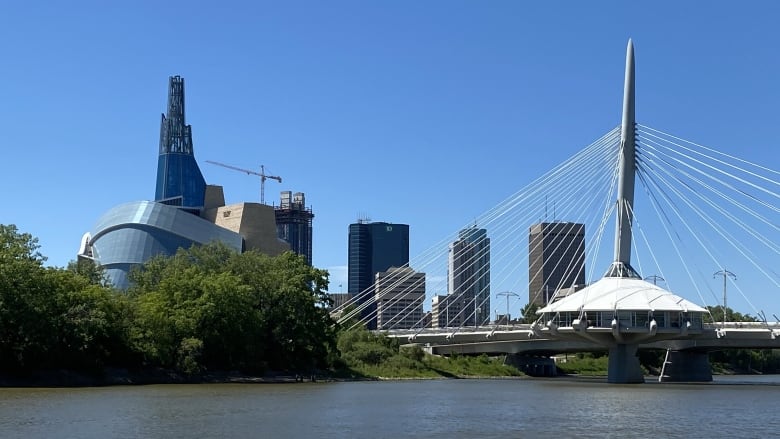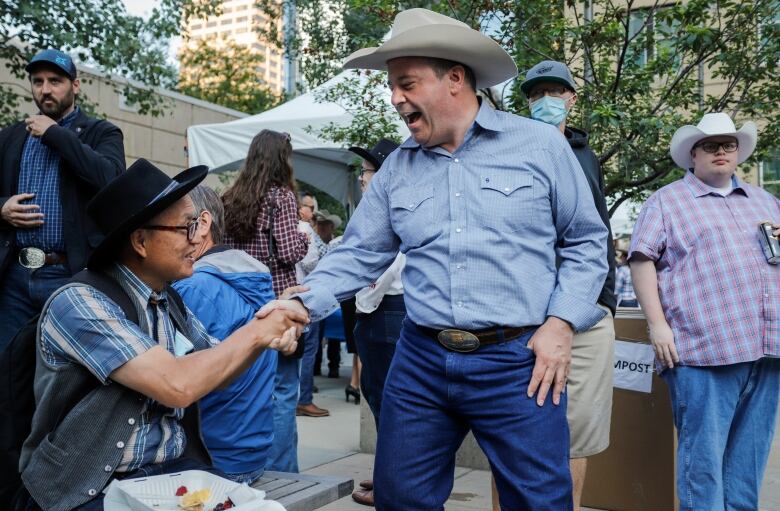It's not safe to jump in just yet: Manitoba wades slowly into post-pandemic waters
Slow approach to lifting restrictions, coupled with vaccinations, is so far staving off a 4th wave

There have beentimes over the past 16 months when this pandemic has felt like a Hollywoodmovie. In some jurisdictions, the film in question is Jaws.
In one ofthe most memorable scenes from1975 Steven Spielberg classic, the hucksterishmayor of a New England tourist townimplores nervous residents to goswimming even though a great white sharkpatrolsthe costal waters.
"It's a beautiful day, the beaches are open and people are having a wonderful time," Mayor Larry Vaughn says just before he loses another voter in the bloodiest manner possible.
Flash forward 36 years and into our ownreality,and Florida Gov.Ron DeSantis is effectively telling his residents it's safe to go back in the water again.
DeSantis has all but declared the COVID-19 pandemic over. His re-election campaign sellssouvenir beer koozies mocking U.S. public health scientist Anthony Fauci.
The problem is thatthe pandemic is back with a vengeance in Florida,where the highly contagious delta variant has sparked a fourth wave of COVID-19.

Florida is reporting a rolling average of 10,452 new COVID cases a day right now, which is equal to one out of every five new cases in the United States. The combination of a lax public health rules and a middling vaccination rate only two of three Florida adults have a shot has pushed the dream of post-pandemic life a few more months down the road.
Worries tothe west
In Alberta, Premier Jason Kenneyactually declared the pandemic over nine days ago.
"Such a joy to connect with Albertans during Canada's first major event after the pandemic," Kenneytweeted during the Calgary Stampede.
Nearly one incubation period later, Alberta has posted 387 new cases in three days and the reproduction rate of the disease suggests more cases are coming in that province.
Alberta hasthe second-lowest vaccination rate among Canada's provinces and lifted almost all pandemic restrictions earlierthis month. Those factors, combined with the premier's declaration, has some public health experts worried about an imminent fourth wavein the shadow of the Rocky Mountains.

To be fair, a fourth wave is imminent almost everywhere. The real question is how hard it will hit and how well governments have prepared.
Close, but not there yet
In Manitoba, where vaccination rates are higherand the province has kept many public health restrictions in place, officials are still bracing for a delta-induced fourth wave.
"COVID-19 is going to be with us, it's going to be with us through the fall, we're going to see transmission occurring mostly within the unvaccinated, and then we're going to see severe outcomes almost exclusively in the unvaccinated," Chief Provincial Public Health Officer Dr. Brent Roussin said during a Monday news briefing.
While Roussinhas spent weeks dangling the carrot of a future without pandemic restrictions, he's been careful not to place the pandemic in the rear-view mirror.
"We're getting more and more Manitobans vaccinated with each passing day, which means we're getting closer and closer to a post-pandemic Manitoba with each passing day," he said.

A post-pandemic Manitoba is a future where COVID-19 still makes some people sick, but is no longer an immediate threat to the provincial health-care system. Vaccines aremakingthis a reality.
Already, vaccines have cutthe COVID-19 case fatality rate by two thirds. During the first year of the pandemic, 2.9 per cent of the Manitobans diagnosed with COVID died from the disease.
Since the beginning of March, when Manitoba began immunizing the general public, that case-fatality rate has dropped to one per cent.
On the flip side, the number of breakthrough COVID-19 infections that is, positive cases among fully vaccinated people has remained extremely low.
Of the first 740,024 Manitobans to receive two vaccine doses, only 375 contracted the disease 14 days after their second dose, a spokesperson for the vaccine implementation team said Monday.
That means 99.95 per cent of fully vaccinated Manitobans have remained COVID-free.
Of the fully-vaccinated Manitobans to contract COVID, 11 have died. That works out to a COVID-fatality-avoidance rate of 99.999 per cent for the fully vaccinated.
Manitoba shows restraint
Nonetheless, the vaccines may not deserve all the credit for Manitoba's suddenly positive pandemic picture. After enduringdisastrous failures during the second and third waves of COVID-19, the province has opted for a slow approach when it comes to lifting its latestrestrictions.
"This reflects a bit of a different approachmore discipline, more caution and I really applaud the government and public health for it," said Dr. Jillian Horton, a Winnipeg internist who has been a vociferous critic of Manitoba's pandemic response.
Horton said Manitoba's restraint this summer could prevent the fourth wave from getting out of hand here this fall and she commended the province for avoiding the haste in which Alberta and Saskatchewan shed their restrictions.
"Both those provinces have tossed aside a lot of their public health measures all at once, much more quickly. We have chosen an incremental approach here, and I think it is really prudent."












_(720p).jpg)


 OFFICIAL HD MUSIC VIDEO.jpg)
.jpg)



























































































